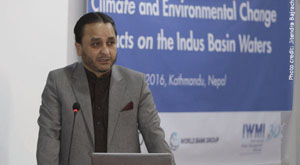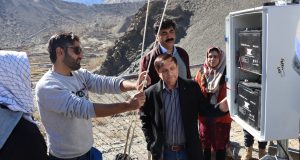By Ahsan Jamil
Better coordination and cooperation amongst scientists, government and development stakeholders was stressed at an International workshop focusing on climate and environmental challenges with special regard to Indus River Basin.
Hafiz Hafeez ur Rehman, Chief Minister Gilgit-Baltistan was representing Pakistan in the conference. “The erratic weather patterns are proving nightmare for not only Pakistan but the whole world. In the shape of flash floods, avalanches, and loss of life and property, Pakistan is paying heavy penalty of climate change being at number 8 amongst list of most vulnerable countries to impacts of climate change”, said Rehman while stressing on need of regional cooperation amongst the countries to cope up with climate challenges.
“International Centre for Integrated Mountain Development and World Bank, and International Water Management Institute (IWMI) deserve immense appreciation for taking this initiative to bring regional stakeholders on board for better policy making and fostering knowledge sharing and expertise in the domain of environmental conservation,” he added.
“The Indus River supports a population of about 215 million inhabitants of Afghanistan, China, India and Pakistan, whose livelihoods depend on these waters”, said Eklabya Sharma, Director of Programme Operations at ICIMOD, emphasizing the importance of research on the impacts of climate change in the Indus basin.
“While reducing knowledge gaps is important, it is equally important that people and communities benefit from the knowledge we generate,” he added. Dr Sharma also stressed the need for transboundary cooperation among the four countries to support the sustainable development and management of Indus waters.
“The Indus Basin is the most glacier and snowmelt dependent basin in the Greater Himalaya region. Climate change and resulting changes in seasonal runoff patterns pose significant challenges to livelihoods and socioeconomic development, and it is the poor who are the most vulnerable”, said Christina Leb, Senior Water Resources Specialist at the World Bank, emphasizing that adaptation strategies and policies need to be informed by science.
The conference, held from 16 to 19 February, brought together more than 80 researchers, policy makers, journalists, and practitioners from the four countries sharing the Indus basin, as well as international experts and representatives of development partners.
 Daily Mountain Gilgit Baltistan News Website News website of Daily Mountain Gilgit Baltistan
Daily Mountain Gilgit Baltistan News Website News website of Daily Mountain Gilgit Baltistan




